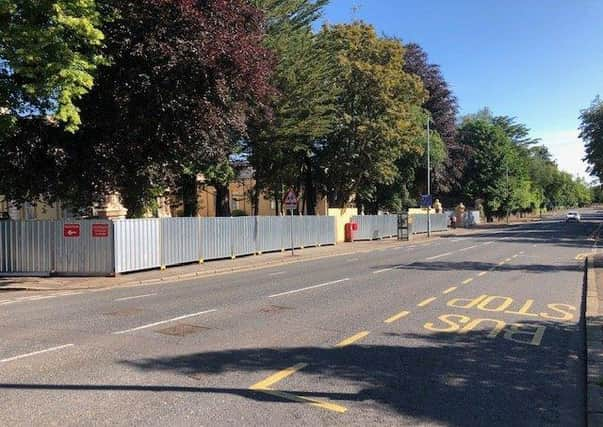Ben Lowry: Weak planning in Northern Ireland was never going to be a match for a China that discards niceties


It was lighter than a normal peak time, more like a July rush hour. But there was enough traffic to make me wonder if much will change after lockdown, or whether we will go back to all our old habits.
One of the many things that I do hope changes in the future is a reduced appetite for large houses that are crammed into small urban sites, often wrecking a green setting that was there before.
Advertisement
Hide AdAdvertisement
Hide AdSuch houses became almost fashionable in recent decades. Double income couples who were actually deterred by large gardens, rather than attracted to them, because they were too busy to tend them, but who wanted plenty of space to park four wheel drive cars.
Thus there was a market for expensive homes with plenty of rooms but postage stamp gardens.
Perhaps that will go into reverse now that lockdown has reminded us all of the value of outside space.
There are reports of a surge in demand for homes with gardens outside cities such as New York and London, where flats had become ever more expensive in recent decades, so that homes in the further flung suburbs were vastly cheaper in comparison. Maybe a similar reversal will happen in greater Belfast, albeit on a much smaller scale.
Advertisement
Hide AdAdvertisement
Hide AdDevelopers might then be less greedy in their aspirations for new homes in urban and suburban sites.
Maybe now they will keep many more of the existing trees and leave more room for lawns and plant beds. Where once they would try to have squeezed in two houses perhaps they will now only build one.
They will only do this if buying habits change and it is harder to sell big houses on small plots.
We certainly cannot rely on planners to protect our neighbourhoods or our countryside, and nor can we rely on politicians.
Advertisement
Hide AdAdvertisement
Hide AdDevelopment controversies have if anything increased now that councillors in Northern Ireland have greater say over planning than they previously did. The Province’s planning policies and enforcement were already lamentably weak.
There has been a raft of letters on these pages in recent months (see link below) about bad planning in both town and rural. It shows that many people resent what is happening.
In the countryside, on both sides of the Irish border, we allow single dwellings to be built in a chaotic, ugly manner which is not tolerated in England, Scotland or Wales.
The problems do not just relate to new housing. In much of Belfast long established homes now have grossly over-sized extensions.
Advertisement
Hide AdAdvertisement
Hide AdIn three other countries in which I have spent significant amounts of time either living or on holiday — New England in the US, southwest France, southeast England — there is much stricter planning.
No-one would dare to breach regulations in such locations, or the structure would be pulled down.
In Northern Ireland, most homeowners play by the rules but those who don’t enjoy near impunity. In my observation, retrospective planning is almost invariably granted to an inappropriate development.
I remember uproar after a charming old house was pulled down in Bryansburn Road in Bangor West, drawing crowds of residents into the street in protest as a developer flattened the building.
Advertisement
Hide AdAdvertisement
Hide AdIt was in a so-called ‘Area of Townscape Character’ where permission is needed. But weak planners rewarded the illegality by later waving through retrospective approval. Several Edwardian villas were also later flattened, and all the replacement buildings were uglier than what had stood there before.
So it is no surprise to me to read of the planning row involving the Chinese consulate on the Malone Road. The site backs on to Adelaide Park, one of the finest old streets on this island. They do not build properties of that calibre any more.
Protesting residents say it took weeks to get Belfast City Council interested — a local authority that hardly has a reputation for vigilance on conservation matters.
I am surprised to learn that diplomatic immunity extends to ignoring planning laws (does that mean a foreign nation can build a skyscraper without approval on an embassy site?) but I am not surprised that China has discarded trivialities such as good neighbourliness.
Advertisement
Hide AdAdvertisement
Hide AdPeople around the western world readily take to the streets to protest about the failures of our free societies.
They are in for a jolt if China becomes the world’s superpower.
• Ben Lowry (@BenLowry2) is News Letter deputy editor
Advertisement
Hide AdAdvertisement
Hide Ad——— ———
A message from the Editor:
Thank you for reading this story on our website. While I have your attention, I also have an important request to make of you.
With the coronavirus lockdown having a major impact on many of our advertisers - and consequently the revenue we receive - we are more reliant than ever on you taking out a digital subscription.
Subscribe to newsletter.co.uk and enjoy unlimited access to the best Northern Ireland and UK news and information online and on our app. With a digital subscription, you can read more than 5 articles, see fewer ads, enjoy faster load times, and get access to exclusive newsletters and content. Visit https://www.newsletter.co.uk/subscriptions now to sign up.
Advertisement
Hide AdAdvertisement
Hide AdOur journalism costs money and we rely on advertising, print and digital revenues to help to support them. By supporting us, we are able to support you in providing trusted, fact-checked content for this website.
Alistair Bushe
Editor